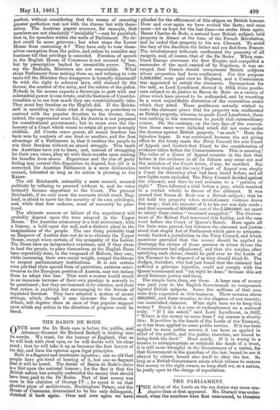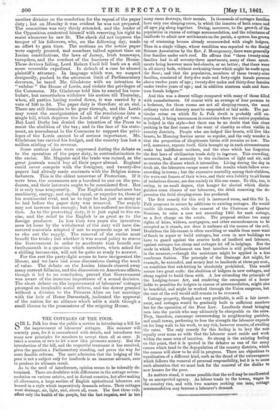THE PARLIAMENT.
THE defeat of the Lords on the tea duties was more con- elusive than at first appeared. Mr. Disraeli Wiffi under- stood, when the numbers were first announced, to threaten another division on the resolution for the repeal of the paper duty ; but on Monday it was evident he was not prepared. The committee was very thinly attended, and the leader of the Opposition contented himself with reserving his right to resist whenever be saw fit. The check did not improve the temper of his followers, who, on the following day, made an effort to gain time, The motions on the notice paper were eagerly pressed, and members talked against time on Ionian constitutions, the laws of Jersey, Irish tramways, turnpikes, and the conduct of the business of the House. These devices failing, Lord Robert Cecil fell back on a still more venerable expedient. In default of a case he abused plaintiff's attorney. In language which was, we suspect designedly, pushed to the uttermost limit of Parliamentary decorum, he taxed Mr. Gladstone with an intention to " subdue " the House of Lords, and violate the privileges of the Commons. Mr. Gladstone told him to amend his voca- bulary, but nevertheless withdrew his motion till Thursday, when, all parties having cooled down, it was carried by a vote of 100 to 54. The paper duty is therefore at an end. There are still formulas to be gone through, and the Lords may resist the amalgamation of all the resolutions into a single bill, which deprives the Lords of their right of veto. But Lord Derby has denied the intention of the Peers to resist the abolition of the tax; and in the face of his state- ment, an amendment in the Commons to support the privi- leges of the Lords cannot be of serious importance. Mr. Gladstone has carried his budget, and the country has lost a million stirling of its revenue. Some curious ideas were expressed during the debate as to the operation of the paper duty, in contradistinction to the excise. Mr. Maguire said the trade was ruined, as the great journals would buy all their paper abroad. England could never compete with the foreigner, and twenty-five papers had already made contracts with the Belgian manu- facturers. This is the oldest nonsense of Protection. If it were true, the consumers are a hundred to one on the pro, ducers, and their interests ought to be considered first. But it is only true temporarily. The English manufacturer has machinery, energy, and capital equal, or superior to, those of his continental rival, and as to rags he has just as many as he had before the paper duty was removed. The supply may not increase fast enough ; but it has suffered no diminu- tion. As to the protecting duty, it is just equal to the ex- cise, and the relief to the English is as great as to the foreign producer. In less than two years the inventive. ness let loose by the withdrawal of the duty will have dis- covered materials adapted if not to supersede rags at least to eke out the supply. The removal of the excise must benefit the trade ; but whether it was sound policy to starve the Government in order to accelerate that benefit one twelvemonth is a question which members, when asked for a shilling income-tax, will not be quite so ready to answer.
For the rest the party-fight seems to have invigorated the House, and we have had some discussions during the week of value. The debate on the Ionian Islands cleared away many current fallacies, and the discussion on American affairs, though it led to no conclusion, proved that Government was aware of the immense importance of a sound decision. The short debate on the improvement of labourers' cottages presaged an invaluable social reform, and the dower granted without a division to the Princess Alice on her marriage with the heir of Hesse Darmstadt, :indicated the approval of the nation for an alliance which adds a sixth though a small throne to the possessions of the reigning House.































 Previous page
Previous page